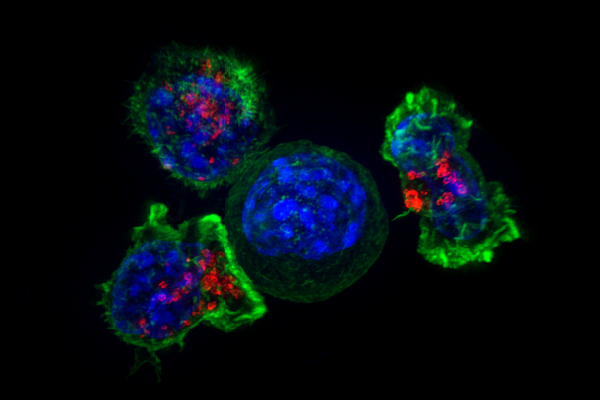Experimental drug combination shows potential for triple-negative breast cancer

Researchers from Vanderbilt-Ingram Cancer Center discovered a role for MYCN in triple-negative breast cancer (TNBC), a particularly aggressive form of the disease, and identified a potential intervention for further clinical investigation.
Although there is no way to currently target MYCN directly, investigators from the Pietenpol laboratory determined that experimental drugs called BET inhibitors are effective against TNBCs in model systems that overexpress MYCN, especially when coupled with the inhibition of MEK, another known oncogene. MYCN is a well-known oncogene that plays a role in cancer aggressiveness, but it is typically associated with neuronal and neuroendocrine cancers.
The research, published in Science Translational Medicine, sets the stage for clinical trials and a potential treatment for TNBCs with the MYCN oncogene. The study is the cover story of the March 11 issue of the journal. It's based on the dissertation work of Vanderbilt graduate student and first author Johanna Schafer, Ph.D., whose brother designed the issue's cover art. Schafer did her graduate research in the lab of Jennifer Pietenpol, Ph.D., the Benjamin F. Byrd Jr. Professor of Oncology and the study's senior author.
TNBC is a particularly difficult type of breast cancer to treat. Although it represents about 15% of breast cancers, TNBC accounts for about 25% of all breast cancer-related deaths. Treatment options for many patients are still limited to chemotherapy.
"This study provides pre-clinical data for investigation of the potential utility of MEK and BET inhibitors in advanced triple-negative breast cancer," said Pietenpol, Vanderbilt-Ingram director, Executive Vice President for Research at Vanderbilt University Medical Center and holder of the Brock Family Directorship in Career Development. "As a next step, our research team is proposing the further development and clinical trials of this combination therapy."
A number of MEK inhibitors have already been approved by the U.S. Food and Drug Administration. BET inhibitors are a class of compounds currently under clinical development.
Elevated MYCN expression had previously been observed in tumors of the nervous system and non-neuronal tumors, such as neuroendocrine and prostate cancer, hematological malignancies and small cell lung cancers. The study found MYCN is heterogeneously expressed within a substantial fraction of TNBCs and in a higher rate of cases that don't respond to chemotherapy.
More information: J.M. Schafer el al., "Targeting MYCN-expressing triple-negative breast cancer with BET and MEK inhibitors," Science Translational Medicine (2020). stm.sciencemag.org/lookup/doi/ … scitranslmed.aaw8275



















